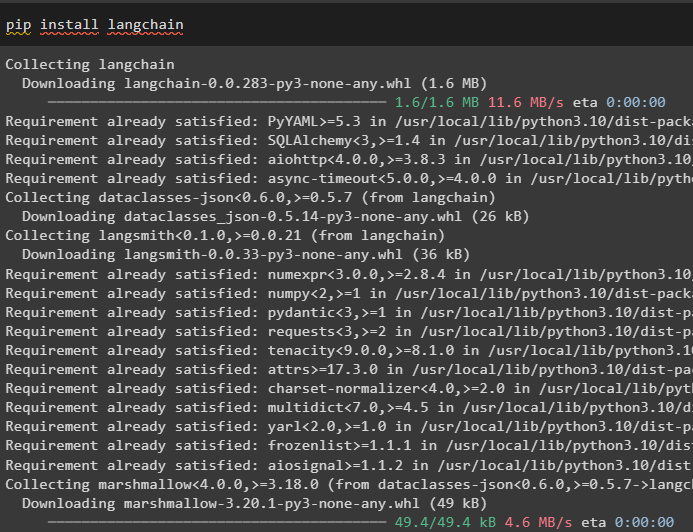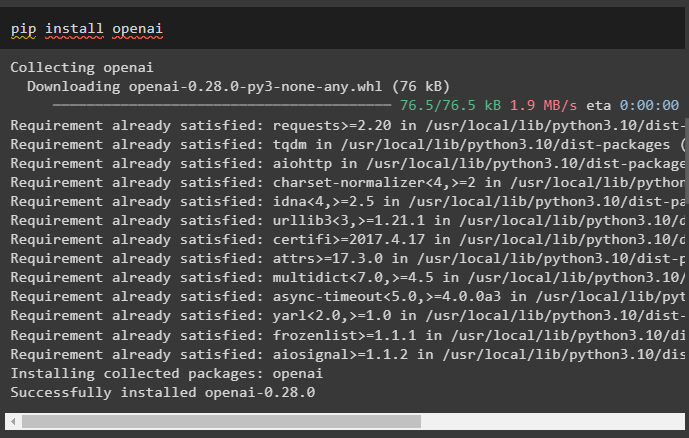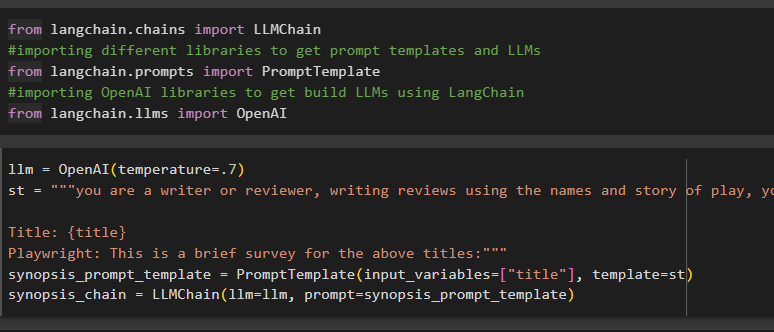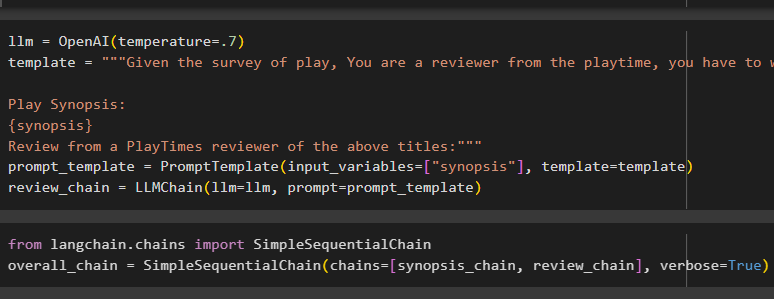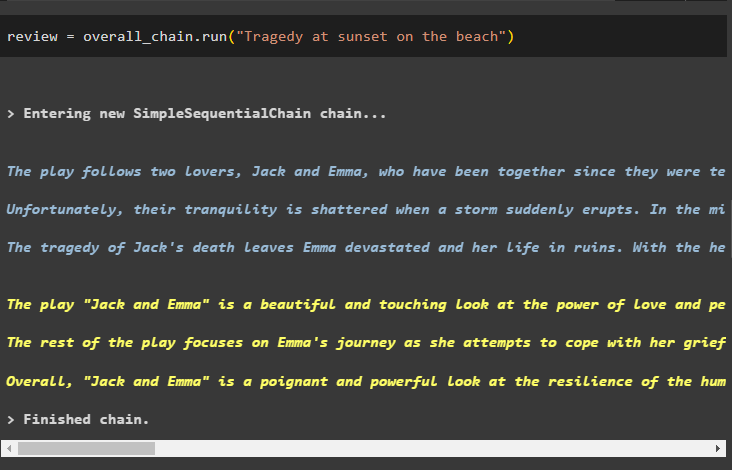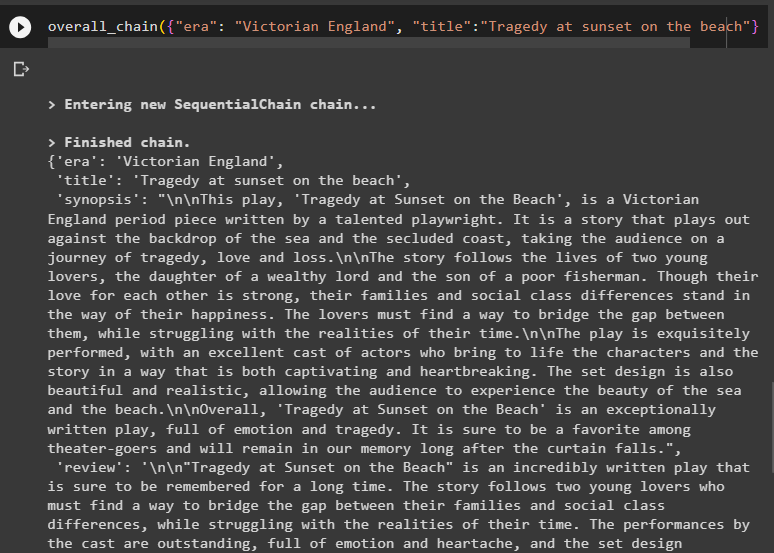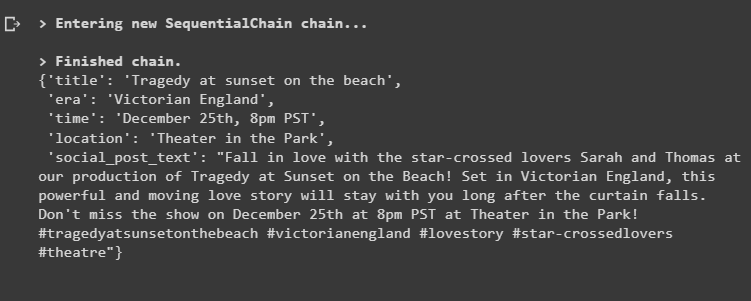LangChain is the framework that can be used to build Language Models like chatbots that can be used to ask questions in human languages. After building these models, the user can call them using the queries/prompts in natural language so the model can respond by generating text. The next step after calling the model is to make a sequence or series of calls so the model can use the output of the call and make it the input of other processes.
This guide will illustrate the process of using sequential chains from LangChain.
How to Use Sequential Chains in LangChain?
The LangChain offers multiple sequential methods to use while calling the models like using the SimpleSequentialChain() and SequentialChain() methods.
To learn the process of using the sequential chains in LangChain, simply head inside to the listed steps:
Installing Modules
First, start using the sequential chains by installing the LangChain framework:
After that, install the OpenAI module that can be used to get its libraries and dependencies to build chains:
Set up the environment for the OpenAI using its API key after signing into the account:
import getpass
os.environ["OPENAI_API_KEY"] = getpass.getpass("OpenAI API Key:")
Method 1: Using SimpleSequentialChain
In this method, import the libraries that can be used to build the LLMChain using the modules installed earlier:
#importing different libraries to get prompt templates and LLMs
from langchain.prompts import PromptTemplate
#importing OpenAI libraries to get build LLMs using LangChain
from langchain.llms import OpenAI
Now build the LLM using the OpenAI() method that can be used to write a synopsis using the title of a play:
synopsis_template = """you are a writer or reviewer, writing reviews using the names and story of play, you have to write the reviews for the plays
Title: {title}
Playwright: This is a brief survey for the above titles:"""
synopsis_prompt_template = PromptTemplate(input_variables=["title"], template=synopsis_template)
synopsis_chain = LLMChain(llm=llm, prompt=synopsis_prompt_template)
Set up the prompt template for building the LLM using the different titles of the plays and the model will return their reviews:
template = """Given the survey of play, You are a reviewer from the playtime, you have to write the reviews for the plays
Play Synopsis:
{synopsis}
Review from a PlayTimes reviewer of the above titles:"""
prompt_template = PromptTemplate(input_variables=["synopsis"], template=template)
review_chain = LLMChain(llm=llm, prompt=prompt_template)
Using the SimpleSequentialChain() method using the synopsis and review templates as the parameters:
overall_chain = SimpleSequentialChain(chains=[synopsis_chain, review_chain], verbose=True)
Testing Chains
Now, run the chain to get the overall results using the templates for the prompt provided by the user:
The user can simply run the chain to get a specific outcome from the model like the following code returns the reviews of different plays:
Method 2: Using SequentialChain
The next model uses the SequentialChain to build the LLM using the OpenAI() to build a similar model as the previous method does:
st = """you are a writer or reviewer, writing reviews using the names and story of play, you have to write the reviews for the plays
Title: {title}
Era:{era}
Playwright: This is a brief survey for the above titles:"""
spt = PromptTemplate(get=["title", "era"], template=st)
synopsis_chain = LLMChain(llm=llm, prompt=spt, output_key="synopsis")
Configure another prompt template by providing the titles for different plays to print their reviews:
template = """Given the survey of play, You are a reviewer from the playtime, you have to write the reviews for the plays
Play Synopsis:
{synopsis}
Review from a PlayTimes reviewer of the above titles:"""
pt = PromptTemplate(input_variables=["synopsis"], template=template)
review_chain = LLMChain(llm=llm, prompt=pt, output_key="review")
Use the SequentialChain library to create a series of chains to get the output (synopsis and reviews) using the input prompt:
#importing SequentialChain library to configure the chain for overall results
overall_chain = SequentialChain(
#configure sequential chain method with multiple arguments like variables
chains=[synopsis_chain, review_chain],
get=["era", "title"],
output_variables=["synopsis", "review"],
verbose=True)
Testing Chains
Simply test the chain to get the synopsis and review of the title provided by the user as the input_variables:
Method 3: Using Memory in Sequential Chains
The last method in this guide is building LLMChain using SequentialChain with the SimpleMemory library. After that build, the model by providing the structure of the prompt and running the chains all in the same code:
from langchain.memory import SimpleMemory
llm = OpenAI(temperature=.7)
template = """Act like a manager for a company running a theater and building posts for publicity, Use the title of the plays like the era, the date, time and location, the survey of the title, and the review of the play, you have to write the social media post for the plays
Use the context like time and location of the play:
Date and Time: {time}
#setting the template for the prompt using the time and location variables to get the exact information
Location: {location}
Play Synopsis:
{synopsis}
Survey from the PlayTimes reviewer of the above play:
{review}
Social Media Post:
"""
prompt_template = PromptTemplate(input_variables=["synopsis", "review", "time", "location"], template=template)
social_chain = LLMChain(llm=llm, prompt=prompt_template, output_key="social_post_text")
#testing the sequential chain by providing the values for the variables used as the arguments
overall_chain = SequentialChain(
memory=SimpleMemory(memories={"time": "December 25th, 8pm PST", "location": " London Park"}),
#testing the specific chains by providing the variables used for the arguments and their values
chains=[synopsis_chain, review_chain, social_chain],
input_variables=["era", "title"],
output_variables=["social_post_text"],
verbose=True)
overall_chain({"title":"Tragedy at sunset on the beach", "era": "Victorian England"})
Output
The output screenshot displays the chains have been completed successfully using the title of the play:
That is all about the process of using sequential chains in LangChain.
Conclusion
To use the sequential chains in LangChain, simply install the required frameworks to get their dependencies to set up the OpenAI environment. LangChain offers multiple libraries to build and use sequential chains like SimpleSequentialChain, SequentialChain, and SimpleMemory. This guide has explained all the methods of building and then running the chains to build sequences using the LangChain framework.

